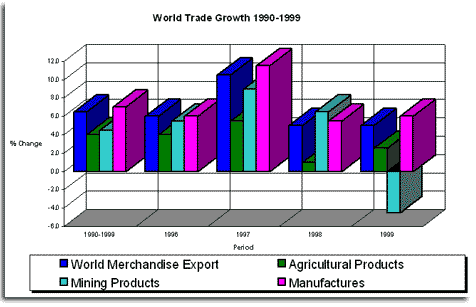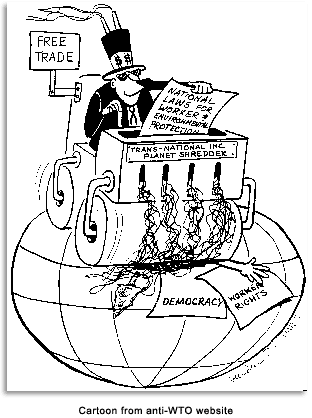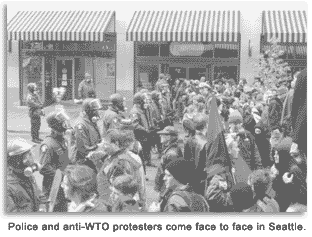The World Trade Organization is a rules-based, member-driven, nongovernmental organization (NGO). All decisions are made by member countries, and the rules are the outcome of negotiations among members. The WTO is the only global international organization dealing with the rules of trade among nations. At its heart are international agreements, negotiated and signed by the 148-member trading countrieses and ratified in their parliaments. Countries continue to be accepted as they evolve. The goal of the WTO is to help producers of goods and services, exporters, and importers conduct their business. The WTO was established in Geneva, Switzerland, on January 1, 1995.
The driving forces behind the WTO are the Trilateral Commission and the Council on Foreign Relations (CFR); both are NGOs. The WTO Secretariat is headed by a director general. Various divisions are answerable to the director general or one of his deputies. Other international organizations and instruments dealing with the rules of international trade include:
 Trade agreements and treaties involving social, business, local, regional and international law have existed at least since the beginning of recorded human transactions. Each country tends to protect its own industries, labor force and territory with tariffs and quotas, which create trade barriers. Internal corruption adds to the problems of numerous countries. The situation has caused international trade to become complex and has retarded the growth of many national economies.
Trade agreements and treaties involving social, business, local, regional and international law have existed at least since the beginning of recorded human transactions. Each country tends to protect its own industries, labor force and territory with tariffs and quotas, which create trade barriers. Internal corruption adds to the problems of numerous countries. The situation has caused international trade to become complex and has retarded the growth of many national economies.The world's corporate and political leadership has rapidly restructured global politics and economics on a level that is as historically significant as any since the Industrial Revolution. Yet there is little discussion or even recognition by the public of this new "free market," nor the aforementioned institutions and agreements enforcing the system. WTO agreements tend to supercede many internal laws of member nations, which erode the sovereignty of those governments.
The WTO organizations cited above have evolved over the last decade, are constantly refined, and in some cases merged or supplanted. Modern treaties and trade agreements are negotiated by representatives of participating governments, and interested parties or NGOs. Concessions are allowed before the agreement is accepted by both parties. The historical signifigance of the WTO agreements is, in part, the erosion of national sovereignty of member nations, thanks to some of those concessions. Concessions usually are in the form of reduced or eliminated tariffs and quotas, but also extend to environmental, labor and humanitarian law.
 Three WTO components
A negotiating forum. Essentially, the WTO is a nongovernmental organization in itself, in which member governments meet to sort out the trade problems they face with each other. When countries have faced trade barriers and wanted them lowered, the negotiations have helped to liberalize trade. The WTO is not just about liberalizing trade, and in some circumstances its rules support maintaining trade barriers; for example, to protect consumers or prevent the spread of disease.
Three WTO components
A negotiating forum. Essentially, the WTO is a nongovernmental organization in itself, in which member governments meet to sort out the trade problems they face with each other. When countries have faced trade barriers and wanted them lowered, the negotiations have helped to liberalize trade. The WTO is not just about liberalizing trade, and in some circumstances its rules support maintaining trade barriers; for example, to protect consumers or prevent the spread of disease.
A set of rules. The authority of the WTO agreements is based upon trade agreements negotiated and signed by its membership governments. The agreements provide the legal ground rules for international commerce. The system’s overriding purpose is to help trade flow as freely as possible — so long as there are no undesirable side effects.
Settling disputes. Trade relations often involve conflicting interests. Agreements, including those painstakingly negotiated in the WTO system, often need interpreting. The most harmonious way to settle those differences is through some neutral procedure based on an agreed legal foundation. That is the purpose behind the dispute settlement process written into the WTO agreements.
Effects of globalization The world's resources are not evenly distributed. Intercultural trade has been important to most populated regions for several millennia. Modern international trade provides access to most of the planet's resources and products to anywhere there is need and the capital to pay for it. While the WTO and other current trade agreements and treaties seek to open all markets, the agreements necessarily create shifting economies that cause casualties. While the WTO has stipulations in its treaties created to compensate for shifting economies and markets, it is left up to the governments of member countries to retrain and care for the people affected.
According to the United Nations, urbanization and globalization have accelerated dramatically and have contributed to an increase in both rural and urban poverty. The UN further claims that urbanization and globalization are modern-day facts of life. Rural populations seek urban employment at rising rates. Today’s cities must compete with one another to attract capital. To do so, many local authorities offer attractive financial incentives as well as such practical ones as well-functioning infrastructure and urban services, efficient communications and transportation, sufficient housing and access to educational and recreational facilities. But in the new “urban archipelago” of competitive cities linked by today’s globalized economy, the riches are passed from one wealthy hand to another. The poor have been left behind.
 Alleviating poverty
International Monetary Fund. Also known as the “Fund," the IMF was conceived at a United Nations conference at Bretton Woods, New Hampshire, in July 1944. The 45 governments represented sought to build a framework for economic cooperation that would avoid a repetition of the disastrous economic policies that had contributed to The Great Depression of the 1930s.
Alleviating poverty
International Monetary Fund. Also known as the “Fund," the IMF was conceived at a United Nations conference at Bretton Woods, New Hampshire, in July 1944. The 45 governments represented sought to build a framework for economic cooperation that would avoid a repetition of the disastrous economic policies that had contributed to The Great Depression of the 1930s.
World Bank. The World Bank's mission is to fight poverty and improve the living standards of people in the developing world. It is a development bank that provides loans, policy advice, technical assistance and knowledge-sharing services to low- and middle-income countries to reduce poverty. The bank promotes growth to create jobs and to empower poor people to take advantage of those opportunities.